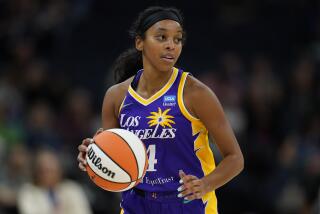Team, Award Officials Cost Bird Opportunity
As the catalyst for the national champion Connecticut Huskies, who bulldozed through women’s college basketball last season 39-0, Sue Bird collected every postseason award she was eligible to win.
Except one.
Bird was a finalist for the Honda-Broderick Cup, which goes to the women’s collegiate athlete of the year. But her WNBA team, the Seattle Storm, would not let her fly to Dallas for the awards dinner June 17, insisting that she stay for a practice to prepare for last Tuesday’s game against the Sparks.
The award was presented to USC sprinter Angela Williams, who this season became the only athlete, male or female, to win four consecutive NCAA titles in the 100 meters.
Williams is very deserving of the honor.
Bird also is deserving. She should have had a chance to win. But, because she was not allowed to attend the awards dinner, her name was removed from final consideration.
Storm spokeswoman Valerie O’Neil said team officials did not want to slight Bird or the award officials, but they felt having the award dinner the night before a game was not in the Seattle team’s best interests.
“The [award] schedule was a challenge,” O’Neil said. “It was a tight schedule for the team and Sue. We try to accommodate what we can during the season, but our policy is the priority has to be the team. And players cannot miss practice or games. She needed to be here.”
O’Neil went on to say the Storm did discuss having a satellite hookup and other types of options with the award officials, but an agreement could not be worked out.
Judy Holland, consultant to the awards program, said she personally did not talk with the Seattle Storm. But she was certain that the Honda officials would not have agreed to that or any other stipulation.
“It has been a long-standing policy that you have to be [at the award ceremony] to receive the Honda-Broderick Cup,” Holland said. “And every other nominee was there that night.”
Holland added that Bird did win the award for women’s college basketball player of the year, and a video of her was shown.
With respect to both the Storm and the Honda Award, there needs to be some flexibility.
A flight to Dallas would have been about four hours. Bird could have caught a red-eye after the awards dinner or a Tuesday morning flight and been back in Seattle in time for the game. It’s not as if the Sparks’ game would make or break the Storm’s playoff hopes; it’s the ninth game of the season, and Seattle plays the Sparks two more times.
On the other hand, this is the 26th year of the award, a long time. The awards board has to know the WNBA season is underway, and if geography is going to be a problem for a nominee, then using a satellite hookup or other technology needs to become a plausible alternative.
Bird was the key figure in what many consider the best women’s college basketball team of all time. She is the poster child for the next generation of WNBA players. Yes, she has won plenty of awards. But the chance for the Honda-Broderick Cup was taken away through no fault of her own.
Bird would not comment on the situation, other than to say “my responsibility is to the Storm.” Others close to the team will tell you she wanted to attend but did not make it an issue.
As usual, the sure-handed Bird did not drop the ball.
Everyone else around her did.
*
If Houston Comet guard Sonja Henning was surprised by the public backlash after her remarks that the players “would be comfortable” with a strike in the face of slow negotiations with the league for a new basic agreement, she shouldn’t be.
The remarks by the players’ association president, no matter how well intentioned, were ill-timed.
Henning, who is a lawyer, should know the first rule about taking that kind of position--
have some leverage first.
And the players don’t have much.
NBA owners are underwriting the league’s operating costs to give the WNBA, now in its sixth year, a chance to take root and grow. They won’t think twice about closing shop if the players want to walk.
At the same time, the players have a legitimate gripe about money, considering the travel and schedule demands put on them. They also have a short window of time in which to make money.
Before the WNBA turns into baseball and threatens to destroy itself by continually poisoning the negotiating process, representatives from the league and the union need to get out of the public arena, and quietly outline an agreement that is practical for the players and owners.
Free agency is a moot point because the 16 teams do not operate independently, and most WNBA owners don’t--for now--want the headache of signing players. The union knows it has a good housing and medical package, and doesn’t want to change that.
That brings the issue back to money.
Doesn’t it always?
That’s why both sides need to start talking to each other instead of threatening each other.
That’s the smart thing to do.
What are the odds of that happening?


